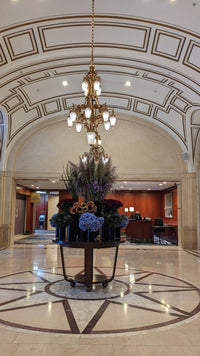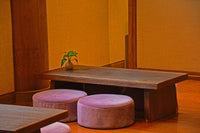The sense of smell is one of the most developed human senses. It links the central nervous system to the outer world. On average, we can distinguish about one trillion scent combinations. When identifying particular scents, we often recall places, emotions, feelings, and memories. Subconsciously, we form aroma-location associations that help us distinguish certain places and develop a “want-to-return” feeling.
Hotels are adopting the strategy of creating unique scent memories to draw guests back again and again. Fragrance or scent zoning has become a powerful practice of using different fragrances in various spaces to evoke certain emotions and states of mind.
Scent Storytelling
It’s no novelty that a sense of smell is a popular tool for creating strong hotel brand associations. Occupying the physical space, scent “tells its story.” People conjure the right emotions when smelling a similar scent again, depicting the place's awareness.
Even after a year, humans can recall smells with 65% accuracy. That’s why hotels take a responsible approach towards creating signature scents. Its primary purpose is to make clients feel like they are a part of the brand as soon as they enter a scented space. The choice of scent depends on the message the hotel wants to convey: connecting scents with locations, creating a relaxing atmosphere, boosting feelings of happiness, or ensuring a focus mode.
The Art of Fragrance Zoning in Hotels
Similarly to how colors and objects in a hotel create particular moods and impressions, fragrances tell their own stories. Layering scents throughout various rooms and spaces within a hotel is the art of fragrance zoning - a unique approach to creating the essence of the hospitality industry.
Scent zoning can give each room a unique atmosphere, character, and vibe. You can ensure a gentle transition of scent by thoughtfully assigning a fragrance to each space, be it a business facility, a restroom, a lobby, or a guest room. Fragrance zoning is more about the rhythm than about the rules. Using various hotel spaces throughout the day, people can live unique experiences many times.
How to Zone Your Hotel Using Scents
Fragrance shapes the hospitality experience and boosts hotel guest satisfaction. It’s vital to choose the right aroma to complement each area's intended atmosphere. From arrival through to departure, scents can create a unique adventure and ensure an exceptional experience for every visitor.
Scenting Hotel Lobbies
Hotels are not only places to sleep but hubs for unwinding and restoring energy. Scents help create the appropriate atmosphere from the moment guests enter the hotel lobby. Luxury hotels use custom scents ranging from sophisticated floral blends to rich woody and musk notes for lobbies. These scents create an inviting atmosphere, add to the hotel’s identity, and boost elegance. Sandalwood, amber, jasmine, and musk perfectly suit hotel lobbies and are often used in five-star resorts.
Perfect Aromas for the Guest Rooms
The best scents for guest rooms generally include fresh, clean, and refined aromas that meet the requirements of the majority of visitors. Fragrances that soothe, evoke a sense of comfort, and ensure relaxation can become an excellent choice for guest rooms. Here we speak about lavender, green tea, and chamomile. Hoteliers often offer rose, musk, and jasmine fragrances for an intimate room setting.
Fragrances for Gyms and Gathering Halls
It’s not easy to scent large spaces that gather many people. Yet, the best fragrance options for this are fresh smells like mint, citrus, and fir needles, which can freshen the mind and boost rejuvenation.
Scenting Business Areas and Conference Rooms
Business environments require scents that enhance productivity and focus. When welcoming business travelers, consider diffusing peppermint, eucalyptus, bergamot, frankincense, or any citrus scent in the meeting room. These aromas have an uplifting effect and promote mental clarity. They can boost concentration, alertness, and productivity.
Essential Oils for Spa Areas
It’s hard to resist visiting spas during the trips, as they provide the best atmosphere for relaxation and detoxification. A vast array of essential oils can complement spa areas. Some of the most popular include: lavender, chamomile, ylang-ylang, frankincense, rosemary, and lemon.
Creating an Inviting Restaurant Ambiance with Scents
Aromas have the power to set the stage for your entire meal, so restaurants select essential oils to craft an unforgettable atmosphere. Scents enhance the dining experience by making restaurants more open and comfortable, clean and energized, welcoming and vital, even during busy service hours. Widely used essential oil blends for scenting dining spaces include white tea, sweet orange, and eucalyptus.
Scenting Yoga Spaces
People associate yoga studios with meditation and relaxation. The right scents for these spaces can enhance the holistic experience of connecting body, mind, and spirit. They can set the tone for various yoga practices, reduce stress, and boost consciousness. Citrus, woodsy, herbal, earthy, and floral fragrances help yoga studios become serene and inspiring places. Rich and natural, they revitalize the senses and allow people to connect deeply to the inner self.
Harmony Everywhere
Hoteliers agree that hotel amenities must surpass the provision of a brick-and-mortar space. It is crucial to satisfy visitors with services, even if they stay for just one night.
By zoning scents throughout a hotel, you set the tone for your guests’ daily activities. It helps a hotel obtain a particular rhythm, and become a feeling that creates a sense of familiarity, makes you live your life to the fullest, and always welcomes you back.








